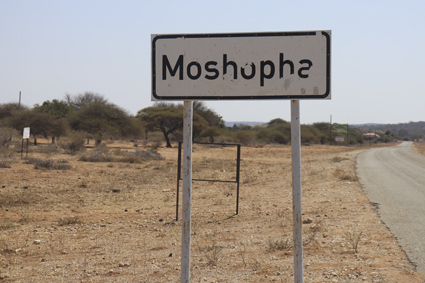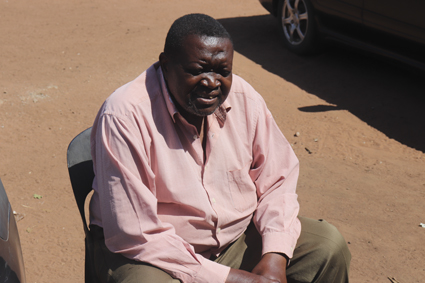Unravelling of Moshopha history
05 Oct 2020
Every village in has a unique history and tradition.
This includes when it was founded and how it was named.
Moshopha, a village with a population of 1 753 according to the last population census, is situated in Tswapong South.
Historical narrations show that the village derived its name from an early settler whose name was Moshopha.
According to the village’s tribal leader, Kgosi Boemo Lechaena, this first settler is believed to have settled on the side of Mabeleapodi hills in 1818 and on realising that the place was not habitable for him and the people he was with, Moshopha is said to have moved to where the village is in 1920 when the war with the Ndebele subsided.
Kgosi Lechaena says the villagers decided to move to where present-day Moshopha is, an area that was, at the time, their farmland.
Tales have it that Moshopha, who was now a kgosi by virtue of him having founded the village, had trekked from Zeerust, South Africa before finally settling in present-day Moshopha.
It is said that before settling at Moshopha, he settled in Borotsi, a village near Sefhare where he was not welcomed by those who had settled there earlier.
After Kgosi Moshopha’s death, the village’s bogosi exchanged hands, passing through his sons Morulane and Rabotshweka and later on to Morulane’ son Lekgetho for whom Rabotshweka had acted as regent.
According to the current Kgosi, years later, Lekgetho finally took over the chieftainship but later relinquished it when he lost eye sight, handing the baton to his uncle Lechaena Rabotshweka to act as regent and hold fort for the rightful heir.
Kgosi Rabotshweka would later die in 1976, paving way for Lekgetho’ son Morulane to become chief.
When he also died in 1990 after 14 years at the helm of the village, the current tribal leader Kgosi Lechaena took over.
That same year, Kgosi Lechaena was promoted to the main kgotla because he was before then a headman of arbitration in the village.
Residents of Moshopha, are according to their Kgosi, staunch believers in ancestors and ancestral worship.
“We believe that our ancestors live in the hills.
We consult them about the affairs of our lives and the welfare of our village and seek direction from them about a lot of things,” he says, indicating that of paramount importance among the activities they often conduct at the hills is offering prayers for rains at the onset of every rainy season.
The rituals are part of their belief system and have been handed down through generations.
According to Kgosi Lechaena, there at some point lived a popular traditional doctor in the village who knew how the rituals were performed and he would be instructed by the chief to lead the morafe in the rain making prayers.
To conduct the prayers, one of the villagers would pledge a black goat and on the day of the ceremony, the traditional doctor would take with him teenage girls and young boys to the caves of Mabeleapodi hills near the village where they would sing ritual songs.
The elders from the village would follow them with the goat, clay pot, seeds and water and upon arrival at the entrance of the caves, they would take the seeds and enter the caves and whisper their pleas to the ancestors.
The goat would then be slaughtered and its carcass cooked, after which its meat would be eaten, unsalted, and whatever left-overs that remained would be burnt.
After the ceremony residents would be rest assured that the rain would fall.
These days however, the current traditional doctors who lead the people of Moshopha in rain making prayers appear to be chancers, and this distresses Kgosi Lechaena, and seeing the once entrenched surefire fail to bring any desirable results breaks his heart.
Nonetheless, residents still see Mabeleapodi hill as the sacred place which their ancestors reside at and they respect it deeply, and because of the spiritual significance it holds, villagers have to seek permission from the kgosi before they climb the hill to avoid accidents. Although the village practices rituals such as rain making, it also embraces modern developments.
The village has a primary school, an upgraded kgotla, a health post and is connected to the national electricity grid.
The chairperson of Moshopha Village Development Committee (VDC) Ms Montle Monoko is however not happy with the pace of developments in her village, a situation that forces villagers to seek most services about 20 kilometres away in Sefhare.
She feels there is need for the clinic in their village to be upgraded, and believes time has also come for Moshopha to have special constables to help the sole police officer in the village to better discharge his policing duties.
Further, Ms Monoko’s other desire is to have the local primary school extended to enable it to adequately cope with the village’s growing population.
She also wishes for the VDC to be assisted to renovate its houses so that it could earn better income from them.
“The VDC does not have money to renovate its houses.
We also plead for government to help us with money to connect electricity in the houses so that we can rent them out to civil servants,” she says.
The high unemployment in the village, resulting in most of the youth loitering around doing nothing also causes the village leadership a lot of heartache. ENDS
Source : BOPA
Author : Portia Rapitsenyane
Location : MOSHOPHA
Event : interview
Date : 05 Oct 2020







